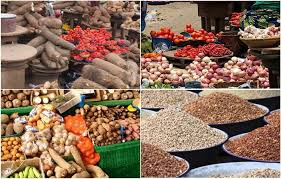Food crisis: Funding research in varsities as part of strategic solution
Food crisis is now growing to assume a troubling national phenomenon in Nigeria. The acute scarcity of food and the attendant inflation in food prices have recently put before the Country, the need for special intervention to address the heightening challenge. The insufficiency of food production to meet population demands continue to wax gross. In its latest report on inflation, the National Bureau of Statistics (NBS) on Tuesday (15th November 2021), had disclosed that the annual food inflation rate rose for the 24th consecutive month to 20.75 per cent in October from 20.71 per cent in September, owing to further increases in the prices of basic food items. The Consumer Price Index (CPI) and Inflation Report for October 2021, by the Bureau had stated thus: “This rise in the food index was caused by increases in prices of food products, coffee, tea and cocoa, milk, cheese and eggs, bread and cereals, vegetables and potatoes, yam and other tubers.”
While, the NBS report showed that the annual Headline Inflation rate continued on its downward trend to 15.99 per cent in October from 16.63 per cent in September, indicating a steady slow down in price increases across the Country, the heightening of food inflation has continued as the recent development revealed the food inflation rate has risen by 7.38 percentage points since May 2019 when it dropped to 13.37 per cent.
The report had partly read: “The consumer price index (CPI) which measures inflation increased by 15.99 percent YoY in October 2021. This is 1.76 per cent points higher than the rate recorded in October 2020 (14.23) percent. Increases were recorded in all classifications of individual consumption according to purpose (COICOP) divisions that yielded the Headline index. On a MoM basis, the Headline index increased by 0.98 per cent in October 2021, this is 0.17 per cent points lower than the rate recorded in September 2021 (1.15) percent. The composite food index rose by 18.34 percent in October 2021 compared to 17.38 percent in October 2020.”
On Tuesday, the 16th November, a report entitled, ‘COVID-19 in Nigeria: Frontline Data and Pathways for Policy,’ released in Washington, had observed that: “While many schools have reopened across Nigeria, learning that was lost during the COVID-19 crisis still needs to be recouped and some children have not returned to school. Even though many Nigerians have returned to work, the jobs to which they have shifted – mainly in small-scale non-farm enterprises – may not offer income security, making it difficult for households to escape poverty. With the COVID-19 crisis ushering in associated shocks – especially to food prices – and social protection remaining rare, households’ food security and their welfare at large is under serious threat.”
The factors spurring the inflation of food prices, as observed, remain deep seated strings of disturbance, which if not addressed only makes a prospect for good omen a facade. Given the importance of food as central among the basic human needs, it is incontrovertible that timely interventions to change the narrative becomes non negotiable.
On Saturday, the 27th November, 2021, President Muhammadu Buhari was reported to have placed a challenge on Universities of Agriculture in the Country to bridge the gap of food insecurity and address the nation’s dependence on imported foods. Buhari who was reported to have made the call at the 10th Convocation ceremony of Michael Okpara University of Agriculture Umudike (MOUAU), Abia, had said the technical Universities must play their crucial role in catalaysing the development of the Agricultural sector, to assist the Federal Government achieve its goal of sustainable green economy. Represented by the Minister of Agriculture and Rural Development, Dr Mohammed Abubakar, he had said the government was looking up to the Universities as lead drivers of the Agricultural sector. It is no doubt that for such institutions to be at the fore front of propelling development in the sector, funding for research is sine qua non.
It has been observed recently how the inflation in food prices have continued to put more Nigerians under unsavoury conditions with resorts to dehumanising conducts, just to make ends meet. The heightening of food inflation seeing food staples recording over 300 per cent hike in price amidst eroding purchasing power, worsened by currency devaluation, has put more of the masses under toughened conditions. It therefore remains indisputable that securing civil obedience and peaceful cohabitation may become more of an ideal than the reality if the prevailing conditions should persist. Situation reports have shown how more Nigerians are turning into streets begging as well as indulging in all sorts of mischievous acts of harassing and dispossessing innocent and unsuspecting citizens of their belongings as a resort to get food.
It is inarguable that the heightening of such phenomenon would take stronger force if situations are left unaddressed without the required promptness and alacrity. Such situations would only lead to conditions degenerating to a state of affair pitching towards the primitive state of nature where life is presumed poor, nasty, brutish and short as posited by the English philosopher, Thomas Hobbes.
The need for the Nigerian government to look into enhancing research focused solutions to the problems has become important to herald new frameworks of systemic responses to address the strains and shortages. While there are several other fundamental subjects, such as security and huge deficits in infrastructures to address, it is pertinent that as it behooves the Government to tackle these issues, attention should not be turned off from the potency of the fruitions which veritable researches would put forward to revitalise the productivity of Agriculture in the Country. Hence, the need to empower research institutions to delve into the prevailing conditions for empirical and scientific studies unto pragmatic solutions to address the acute challenges has become paramount as part of efforts towards mitigating the rising echoes of food crisis in the Country. Funding in this light, remains non negotiable.




